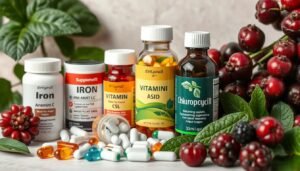How We Vet Brands and Products
When choosing the best Vitamin B12 supplements, understanding brand quality and product potency is essential. Here are key factors to consider:
- Third-Party Testing and Certifications: Reputable brands should undergo third-party testing for purity and quality. Certifications from organizations like NSF International, USP, or ConsumerLab.com provide assurance of a product’s effectiveness.
- Forms of Vitamin B12: Methylcobalamin and cyanocobalamin are the most common forms of B12, with methylcobalamin being more bioavailable and generally preferable.
- Additional Ingredients: Assess for any fillers, additives, or allergens. Opt for supplements with minimal additives to ensure quality and efficacy.

By thoroughly reviewing these factors, you can choose a high-quality Vitamin B12 supplement that aligns with your health needs and dietary preferences.
Benefits of Vitamin B12
Vitamin B12, or cobalamin, plays a vital role in various bodily functions, making it essential for overall health. Key benefits include:
- Red Blood Cell Production: Vitamin B12 supports red blood cell formation, which helps transport oxygen throughout the body. A deficiency can lead to vitamin B12 deficiency anemia, causing fatigue, weakness, and shortness of breath.
- Nervous System Health: It aids in forming myelin, a protective sheath around nerve fibers. Deficiency can cause neurological symptoms like tingling, numbness, balance issues, memory problems, and mood changes.
- Energy Metabolism: Vitamin B12 is crucial for energy production by aiding in the synthesis of fatty and amino acids. Adequate levels help maintain energy and support endurance during daily activities or exercise.
Food Sources of Vitamin B12
Incorporating Vitamin B12-rich foods into your diet is essential. While supplements can help, food sources are vital for balanced nutrition:
- Animal Products: Beef liver, clams, salmon, and eggs are excellent sources.
- Fortified Foods: For vegetarians and vegans, fortified plant-based milks, breakfast cereals, and nutritional yeast can supply Vitamin B12. Look for labels indicating B12 fortification.
- Dairy Products: Milk, yogurt, and cheese also provide B12 and are easy to add to daily meals.
- Plant-Based Alternatives: For those on plant-based diets, options like fortified tofu or tempeh can help meet B12 requirements.

Combining a variety of these foods supports your Vitamin B12 intake, benefiting energy metabolism and nervous system health.
Vitamin B12 Deficiency Symptoms
A deficiency in Vitamin B12 can lead to various symptoms, ranging from mild to severe:
- Fatigue and Weakness: Vitamin B12 is crucial for red blood cell formation. Without enough B12, the body may struggle to transport oxygen efficiently, leading to constant tiredness and weakness.
- Neurological Issues: B12 deficiency affects nerve health, potentially causing numbness, tingling in the hands and feet, balance difficulties, memory problems, and mood changes.
- Megaloblastic Anemia: In severe cases, this type of anemia causes large, malfunctioning red blood cells, resulting in pale skin, dizziness, and heart palpitations.
Recognizing these symptoms and seeking medical attention can prevent further complications.
Vitamin B12 Supplements
For individuals not getting enough B12 from food, supplements are a practical option. Here’s what to consider:
- Supplement Forms: Vitamin B12 supplements come in capsules, tablets, and sublingual sprays. Methylcobalamin or hydroxocobalamin forms are more bioavailable compared to cyanocobalamin.
- Daily Recommendations: The RDA for most adults is 2.4 micrograms. Some groups, like older adults or those with absorption issues, may need higher doses.
- Combination Products: Multivitamins or B-complex supplements containing B12 can be convenient but check labels to ensure sufficient B12 levels for your needs.
Always consult a healthcare provider before starting any new supplement regimen.
Vitamin B12 Injections
In cases of severe deficiency or malabsorption, Vitamin B12 injections provide an effective alternative:
- Absorption Efficiency: Injections deliver B12 directly into the bloodstream, making them ideal for individuals with digestive absorption issues.
- Administration: Prescribed and typically administered by a healthcare provider, injections can vary in frequency (daily to monthly) based on deficiency severity.
- Potential Side Effects: While generally safe, injections may cause mild site reactions. In rare cases, allergic reactions can occur; consult a healthcare provider if unusual symptoms arise.
Possible Side Effects of Vitamin B12
Vitamin B12 is generally safe at recommended doses, but high doses may cause some side effects:
- Allergic Reactions: In rare cases, symptoms may include hives, swelling, or difficulty breathing.
- Skin Issues: Some individuals report acne with high B12 doses.
- Gastrointestinal Disturbances: High doses can lead to stomach pain, nausea, or diarrhea.
- Medication Interactions: Individuals with conditions like Leber’s disease or those undergoing cancer treatment should consult a healthcare provider due to potential interactions.
Summary
Vitamin B12 is essential for red blood cell formation, nerve health, and DNA synthesis. It can be found in animal products, fortified foods, and dairy, while vegetarians and vegans may benefit from fortified foods or supplements. Recognizing deficiency symptoms is crucial, and options like oral supplements or injections can help address individual needs.
Consulting a healthcare professional before starting Vitamin B12 supplementation is recommended to ensure its safety and effectiveness for your unique health profile.